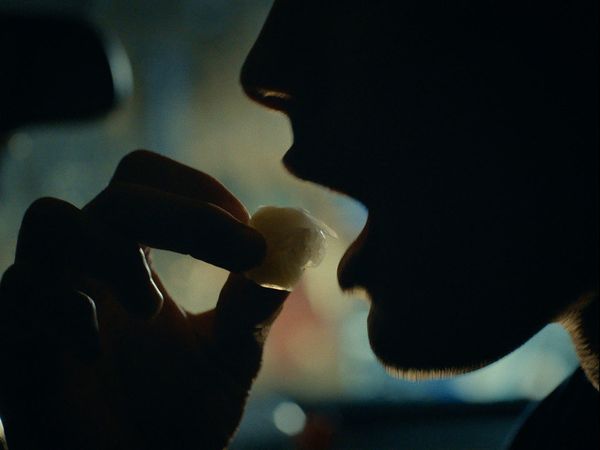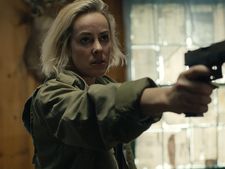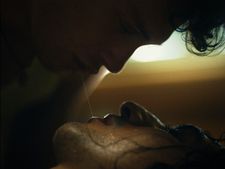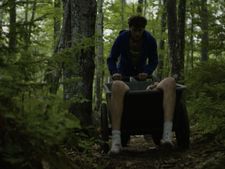 |
| Swallowed Photo: Blue Finch Film Releasing |
Fashion photographer turned genre filmmaker Carter Smith’s unsettling survival and body horror Swallowed, screened in Fantasia’s ‘Queer Genre Cinema Spotlight’ section, and centres on two friends who put themselves in a compromising position.
Celebrating his impending move to Los Angeles to become a gay porn actor, Benjamin is looking forward to escaping his small hometown of Maine. Unbeknownst to him, his friend Dom, has set up an illegal drug run to help fund his Californian adventure. Failing to see the perils of the endeavour, things quickly go awry, as the pair find themselves an ever-evolving nightmare.
 |
| Swallowed Photo: Blue Finch Film Releasing |
In conversation with Eye For Film out of Fantasia, Smith discussed expanding the representation of queer characters and stories, and genre cinema’s historic reluctance towards diverse representation.
Paul Risker: What motivated your transition from fashion photography to filmmaking?
Carter Smith: I came to filmmaking late. I had a career as a fashion photographer for years before I made my first short film. I wanted to make films, specifically horror, since I was a kid. I pursued fashion photography and it happened in a way I hadn't expected. It went well, and at a certain point I thought, ‘It’s 15 years later and I still haven't made a short film. What am I doing? Yes, I'm shooting great advertising campaigns of famous people and making good money, but this was not what I'd always wanted to do since I was a kid coming up with stories.’
[…] I've always been fascinated with horror and fear, manipulating people into feeling things that make them uncomfortable, and fucking with people's expectations. It’s something I've loved to play around with, and in genre, there are so many expectations. It’s fun as a storyteller to find ways to subvert those, and hopefully surprise people by taking them down a path they weren't expecting.
PR: When subverting expectations, do you need to be cautious to find the balance with what’s familiar?
CS: When you're making the film, you have ten minutes at the beginning to give the audience a character, or a couple of characters to latch onto and feel, ‘Okay, I’m going on a ride with this person’, or, ‘I can identify with this person.’ By giving an audience someone they can see a little bit of themselves in, for whatever small portion of the character that is, it allows them to let go in a story.
PR: I’ve heard adult performers talk about how the one negative of the industry is the perception. It’s interesting that one of your lead protagonists is pursuing a taboo dream, as a means to escape his hometown.
 |
| Swallowed Photo: Blue Finch Film Releasing |
CS: Especially when that one place is a small town where you don't fit in, and you don't see people that you can relate to, or that maybe understand you as well as you want to be understood. It’s a very small town in Maine where this film takes place. I grew up in Maine, and I know exactly what it's like to feel like an outsider in your own town.
In the age of Only Fans, porn is maybe less of a taboo than it was. Everywhere you look, people are trying to get you to sign up to their Only Fans, and Benjamin sees it as a ticket out of this small town where he knows he doesn't belong.
PR: Is it a sign that America is liberating itself sexually by becoming more accepting, or is it still difficult to gauge?
CS: It might be happening gradually. There are always people that are going to look down on it, but there's more people making that content, and let's be honest, 99.9% of people in this world consume that content. It's hypocritical to look down on something that you're secretly watching.
It’s being normalised and like Benjamin says, he's not ashamed, he's more curious and excited for this life change, which is an interesting and modern way to look at adult film work, or the porn industry.
PR: Swallowed is aware of the need to enter the conversational space of countering guilt and shame, to speak about the importance of exploring who we are and being honest with ourselves
CS: I wanted to create a genre movie that I’d have loved growing up as a small town queer kid, where I could see people that looked like me, talked like me, and loved like me.
The horror community hasn't always been the most accepting or open. Yes, we're sort of on the outcast edge of the spectrum, but even within the community, traditionally and historically it has not been the safest space for queer stories. We're the first ones to get killed, or we're the brunt of the joke.
 |
| Swallowed Photo: Blue Finch Film Releasing |
As much as there are legions of queer horror fans, the films traditionally haven't served that audience in a way where they really felt they could see themselves. It has been exciting in the last couple of years to see that shift where stories are encompassing all different types of characters.
PR: What films have stood out to you as influencing this change?
CS: We're All Going To The World's Fair is not necessarily a queer story, but it's an independent queer voice and filmmaker.
Now you're putting me on the spot and my mind is going blank, but the fact that I was able to go and make a queer slasher [Midnight Kiss] for Blumhouse, where all the characters were queer. They were super supportive of hiring queer actors to play the queer parts. At Blumhouse and for Hulu, I think that's progress.
PR: There’s the idea that filmmakers are remaking the same film. I argue that the underlying reason for similarities is that storytellers are drawn to certain themes. How do you look at your collective body of work to date, and was it intentional to expand your creative voice?
CS: Like you said, everyone has themes that they're attracted to, and you might not even be making those choices consciously. I do find myself drawn again and again to certain types of stories, or certain types of relationships.
I never actively said, “I want to do this next.” It was always a response to material, and The Ruins landed in my lap as a script. After Bugcrush was at Sundance, I got an agent who sent me scripts. It was the first one I really loved because it had an interesting character dynamic to explore. I'm less likely to be drawn to something because it's a vampire movie or action. I'm drawn to complicated relationships between characters who are in difficult situations. That's what I love to play around with more than anything.
 |
| Swallowed Photo: Courtesy of Fantasia International Film Festival |
I love films where everything goes wrong, then it gets worse, and then something else happens, and it gets worse again.
PR: Besides trying to create an uncomfortable experience in which you subvert the expectations of your audience, are you trying to convey a message?
CS: I'm never big on message. Yes, there's going to be stuff that emerges, but I wanted to tell a fun rollercoaster story that had the characters I wanted to see in the type of story that I love.
What was so important about this film was taking people on a fun ride, fun being the operative word. I don't know, is it fun? To mess with people and have them squirm, to look away, cringe and laugh, and get involved in that dynamic between the two characters.
I never go into something thinking, 'This is my message that I want to get across.’ The message ended up being: Let’s see more different types of queer stories in scary movies.
It has been interesting hearing from people who've seen the film, who say, “I've been waiting to see characters like this in one of these movies.” The validation of hearing from these people who are happy to see these types of stories in genre has been great.





















